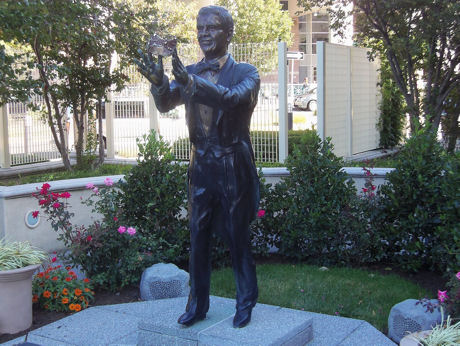 ert
Parks
(December 30. 1914 - February 2. 1992) ert
Parks
(December 30. 1914 - February 2. 1992) |
Eyes: brown
Hair: glossy dark
Marriage:
(1)
Annette Liebman (Jun 8. 1943 - Feb 2. 1992, his death)
children:
twins Joel & Jeffrey (Aug
1. 1947),
Annette
"Petty" Jr. (Mar 24. 1949 - Oct 27. 2007).
Siblings:
Allen Stanford Jacobson (May 20. 1912 - Nov 14. 1972)
|
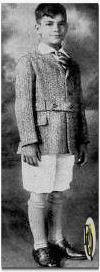 |
Above right: School books and radio scripts vied
for his interest - radio
finally won! |
|
|
Parks was born on December 30. 1914 in Atlanta,
Georgia as Bertram
Jacobson, the younger of two sons of Aaron Jacobson, a Jewish merchant
who had immigrated to the United States in 1900 from Latvia, and Hattie Spiegel,
the daughter of immigrants from Austria-Hungary.
Parks participated in amateur theatricals at the age of four, and gained a reputation in his native Atlanta as a mimic of Charlie Chaplin. As a kind, Bert idolized Charlie Chaplin and sat through his pictures three and four times, studying every trick of the great comedian. "I didn't make very good grades in school," Bert told in a 1948 interview. "No wonder. instead of doing homework, I'd prop a
mirror in front of my arithmetic book, pencil a mustache on my lip and
just mug."
From then on, Bert had the show bug. He didn't think
twice about breaking into his parents' parties to draw some laughs. He
would coax his patient brother, Allen, to play straight man in the
bedroom rehearsals and found a ready audience in his schoolmates for the
stories and monologues he invented.
"I guess I was a run-of-the mill child with a normal, average
childhood. ... From the beginning I liked everything that had to do with
show business. I devised costumes, made up skits, learned to apply
make-up to myself and other kids at summer camps that I attended. I
would sing, dance, handle the curtain and the box office. And when that
wasn't possible I'd simply tell stories around an evening campfire,
rambling on and on until I could find a suitable, dramatic ending for
the tale."
|
Bert's dad made him a stock of the funny little
Chaplin mustaches, got him some baggy pants and the grotesque shoes, and
encouraged him. At the age of nine or ten, when Bert made his first professional debut
with the first Atlantic showing of The Gold Rush, he did an
impersonation of Chaplin. "They gave me twenty dollars in silver to
impress me, but it wasn't silver that jingled in my ears, it was the
echo of the audience applause."
Right: At nine or ten, Bert got his first taste
of applause, imitating Charlie Chaplin |
 |
|
Between 1926 and 1932
young Bert attended Marist College, a prep school run by a Catholic
order in Georgia, Atlanta.
He liked English and
composition, had a fair grasp of mathematics, was "awful" at Latin
and reasonably good in French. Homework bored him "I would start to drum
on the table and make funny faces at myself in the mirror, anything to keep
from getting down to business. In the end I had to go, an I managed to keep
my marks fairly good in most subjects, but I was much more fascinated by the
projects my brother and I were always dreaming up - ways to manage some
extra spending money, ideas for making things, and experiments we wanted to
try. Even from our earliest childhood, if there was any project afoot for
which we needed parental help or consent, my brother would hang back and sen
me in as the front man to do the talking to our father and mother. I had
more nerve, and I could always talk faster and louder than he could."
His entry into the
entertainment world began while he was still in school, performing at local
singing gigs that eventually prompted him to change his name.
At sixteen he won the
City of Atlanta Declamation Contest with The Death of Maximilien
Robespierre by Victor Hugo, no one was too surprised. Shortly afterward
a salesman for the local radio station tried to interest Bert's father in
buying spot radio announcements to advertise his furnishing business. Parks
Sr. mentioned that he had a boy who sang and certainly would be an asset to
any radio program, far more so than most of the singers he heard. In March
1931 they got Bert a chance on a amateur show. He took the prize and was
offered an announcing job a couple of time a week outside of school hours with WGST, the Georgia Tech radio station, in Atlanta, earning $7 a week,
as baritone vocalist and morning announcer.
Within two years, he had become the station’s chief announcer and doubled
his pay. His boss suggested he'd enter a contest a New York station was
conducting. His parents had planned college for him after high school,
but his mother made a visit to the principal during Bert's last school year
to talk over the boy's future. The principal reminded Mrs. Parks that there
was a strong drive in the direction of radio work, which Bert had already
been doing in out-of-school hours for two years. Suggesting it might be just
as well to let him go on with the career he had mapped out for himself. When Bert told his mother about the contest, but that to qualify he
had to go to New York. His mother gave him the money and Bert went to the
big city.
He assured the
director of the contest that he was twenty-one and had several year of
college. Along with several other hopefuls Bert was given the test. Later,
he was told that, unfortunately, he had missed out on the chance to become a
major announcer. Heartbroken, he left New York. Arriving in Atlanta, his
mother told him a telegram had just arrived from New York saying that they
had made a horrible mistake and that he had won the contest
(another version of events states they "reconsidered").
|
|
Parks moved
back to New York City, where - after lying about his age - he became staff
announcer at Columbia Broadcasting Corporation (CBS) radio, it was 1932. He had the winning combination to rate a job as staff
announcer at the age of eighteen (some say 17), a feat
that's never been repeated at any of the major networks. "In New
York I rated fifty dollars, as a staff announcer. In the depression years of
1932-33, it seemed a huge sum. I was able to send home twenty dollars a
week." |
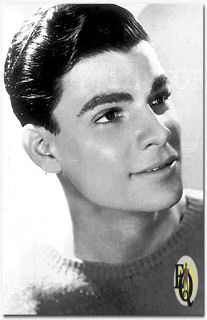 |
|
Parks remained with CBS until 1939, during which time he
not only announced but also acted on the radio Western
Bobby Benson. Next he was given his
own singing program, Dear Columbia, over the network. But his major break came
with The Eddie Cantor Show
(1939-1940), where
he served as the straight man, occasional vocalist, and staff announcer. By
the late 1930s, Parks had also become emcee for
The Xavier Cugat Show and announcer
for the Camel Caravan series.
He was the announcer for the Ellery Queen radio
show on the last part of the first Season in 1940.
In
New York, in early 1941, a friend in Philadelphia who used to come to New
York to see his own girl, arranged a blind date between
Annette Liebman, a Columbia University student, and
a young radio
announcer named Bert Parks. Both were skeptical about the blind date and
when Bert's friend suggested he make a date for both Saturday and Sunday
with a girl he'd never seen, Bert balked. However, they had so much fun
together the first evening that Bert was annoyed when Annette couldn't see
him the following night because, naturally, she had made other arrangements.
Bert implied: "Well, if you're not enough interested, then this is the
end for us." Annette went right ahead and kept her date, being a spunky
young lady of independent mind. What Annette didn't know then was that Bert
went to the country club where she had been escorted by her date and hung
around all evening just to look at her, without letting her see him. As
radio personality Bert meant little to Annette then. She just liked him.
She later said that sitting across from him that first evening, all
she could see were his lips, and she wanted to kiss him. "I knew right
away she was wonderful, and I knew right away she was for me."
Both
loved good food an together would hunt up out-of-the-way restaurants in New
York, then got to Number One Fifth Avenue to hear a favorite singer. In
between, they took long drives into the country with Bert playing the
singing troubadour. "When you see the male lead in a movie singing to
his sweetheart, most people know real life isn't like that. But our days of
courtship were like something out of a musical. Bert has a beautiful voice."
Together Bert and Annette had so much fun they felt none
of the desperation that often makes young couples worry about marriage. With
Pearl Harbor
came the war and with it a more serious attitude. When Bert received his
"Greeting" he was turned down the blindness test a physical defect he didn't know he
had. Bert went to Chicago with Xavier Cugat and while there enlisted in the
U.S. Army, this time he got accepted.
|
|
Bert enlisted in the
infantry as a private. He was sent to Fort Benning Infantry School, and
three months (June, 1943) later became Second
Lieutenant. With an enforced separation they both realized
their love for each other. Annette swooped down to Atlanta, Georgia in a plane, and they
were married
on June 8. 1943 and honeymooned in Macon, Ga. While Bert was at Camp Wheeler, they lived the typical life of an army
couple. It was impossible to find a home or apartment so they lived in
one flea-ridden hotel room after another. Finally after three months
Annette found a furnished room in a private house only to found out,
like many young men in wartime, Lieutenant Parks shipped out, serving as an
infantryman in the China-Burma-India theater.
|
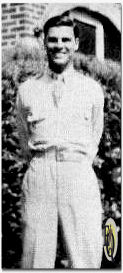 |
|
For the next two
years, he took part in reconnaissance missions, helping to establish
underground radio communications behind Japanese lines—including three
months spent in enemy territory operating a wire recorder. True to his
showman’s spirit, he also managed to announce on weekly army radio
programs. While Bert spent two years with General Joseph “Vinegar
Joe” Stilwell in the CBI Theater, Annette moved in with her parent in
Connecticut and worked in the New Haven Hospital as a nurse's aide.
She did have a date on Saturday night with her husband's voice, although
he was half-way around the world. Bert and Finis Farr were making wire
recordings of combat activities that were played weekly over CBS on the
program Yank in the Orient. Bert
wasn't that lucky. He didn't receive a letter from Annette for six
months. When her mail finally caught up with him, he had 85 letters. In
the meantime he earned the Bronze Star and a cluster of Battle Stars the
hard way. The wire recorder missions were dangerous since they took him
behind the Jap lines for three weeks when several of his buddies were
killed. Almost two years to the month that Bert went overseas, he
returned to the states a Captain.
Parks was discharged in 1945. Annette was joyful to
have him back, but radio was a little les demonstrative. There was no
question of his having a job, but he had to work his way back up again.
People forget quickly. He took any announcing jobs that came along,
small things as well as bigger ones. Then Break the Bank was
born, and studio executives gave him the emcee job on a week's trial
basis. Bud Collyer was already on the show as announcer. He suggested
Bert tot the producer as an ideal master of ceremonies.
So in 1945, Parks
became host of the CBS radio quiz show
Break the Bank. Sponsored by Vicks, the series began on Mutual
Radio on October 20. 1945 until April 13. 1946. Initially, it featured
different hosts each week, including John Reed King and Johnny Olson.
Bert Parks became the full-time host in 1946.
Next to that he'd
also announce on Sunday
Evening Party and the Guy Lombardo Show. He and his wife settled in
suburban Greenwich, Connecticut, in
a one bedroom walk-up apartment and started a family.
Twin
sons Jeffrey and Joel were born on August 1. 1946. A month before they
were born they found a three-room apartment. Their social life was pent
quietly with friends Jack and Terry Rayel,
George and Helen Zachary,
and Mr. & Mrs. Music (Andre Baruch and his wife Bea Wain).
|
|
|
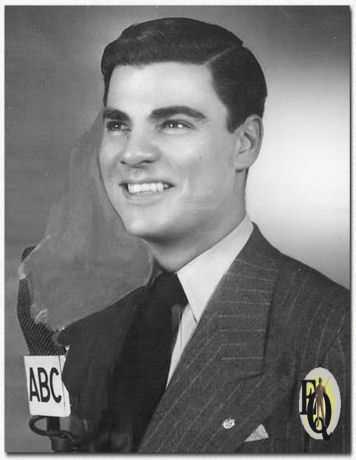 
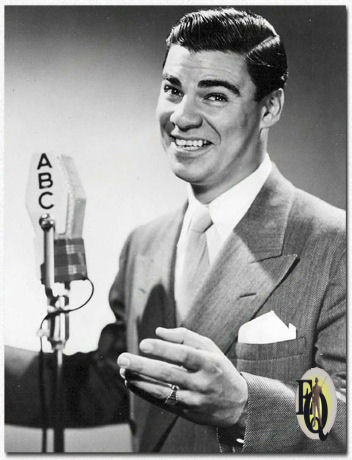 
Top left: Bert Parks a 1946 Press Photo
Top right: From the Ritz Theater in New York, Bert Parks is
Quiz Master at ABC's Break The Bank on Fridays (Radio
Mirror, Jan 1947).
Above left: Bert Parks in a Press Photo for Stop the Music
(1948)
Above right: Bert Parks in Break The Bank (1949) |
|
|
|
Parks’s first venture into TV game shows
was Party Line
on NBC, broadcast
from the network’s New York City flagship station, WNBT. The show
invited viewers to call in, answer questions, and win $5 prizes.
Party Line
aired from June 8 to
August 31. 1947, and its single surviving episode is considered the
oldest known game show—and among the earliest surviving recorded
television programs.*
He was emcee on the
Vaughn Monroe Show when an agency offered to emcee the new
radio show Stop the Music
(ABC, Mar 21. 1948 - Aug 10. 1952) in March of 1948. Now he
had a contract with the Monroe outfit and if he accepted the new and, as
yet, untried program, it would have to be on a sustaining basis at
first, however it
proved so successful that it surpassed NBC’s long-standing favorite,
The Fred Allen Show, in its
time slot. In 1949, however, the Federal Communications Commission
(FCC), concerned about the supposed immorality of giveaway programs,
launched an investigation that briefly threatened to take such shows off
the air. The controversy soon subsided—much to the frustration of Fred
Allen, who decried the triumph of “scavengers” over “entertainers.” When
it was converted to television (ABC, May 5. 1949 -
Apr 24 1952
and Sep 7. 1954 - Jun 14. 1956)
, it retained much of its simplicity and human
interest appeal.
Bud Collyer did the
five-times-a-week radio Break the Bank while Bert concentrated
on the Sunday-night television Bank, with Bud acting as host
and commercial announcer with Bert. It was October 22. 1948, when the televised
version of
Break the Bank started broadcasting on ABC as a simulcast of
the radio program.
The growing Parks clan moved to
a big Colonial-style house of whitewashed brick, an inviting sort of
house designed for "family living", set on a high knoll overlooking a
pleasant suburban community in
Greenwich, Ct. toward the end of the decade, and daughter Annette Jr.,
nicknamed "Petty" or "The Pet", was born there in March of 1949. Work and rehearsal drew
heavily on his energy and him. He gave up two hours in commuting from
his home to Manhattan studios.
In 1950 he started
with The Bert Parks Show (NBC, 1950 - 1952)
where he decided to cut loose from the existing pattern of daytime TV.
Instead of the usual homemaking and interviews, he planned a program of
entertainment of nighttime quality. As girl singer, he chose the bright
and pretty Betty Ann Grove (dancer and comedienne). For music, Parks
hired Bobby Sherwood, the big-name bandleader and TV star in his own
right. Completing the regular cast where The Heathertones a female
quartet.
Parks later
brought his quiz shows to television, achieving remarkable success
during the early 1950s with Double or Nothing
(CBS, Oct 6. 1952 - Jul 2. 1954) as well as the TV version of Balance Your Budget
(CBS, Oct 18. 1952 - May 2. 1953).
|
|
|
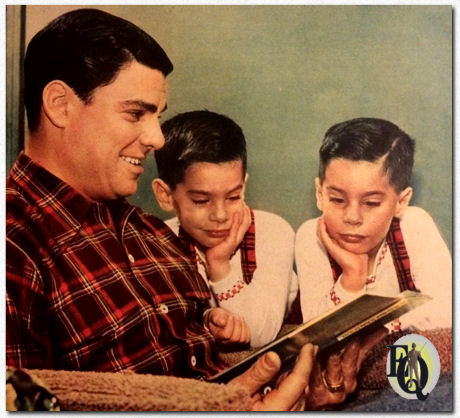 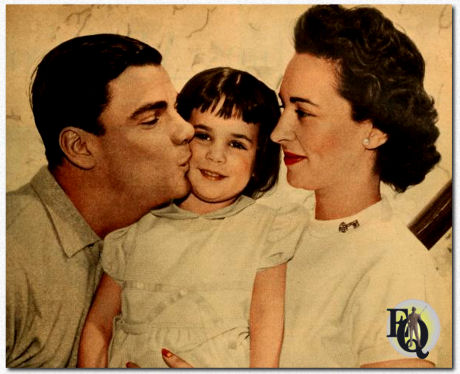
Above left: Bert reading for his
twins Jeffrey and Joel ("the twin with the mole").
Above right: Three's a date, when Bert greets his two Annettes (the
small one's 4 year old "Petty") (1953) |
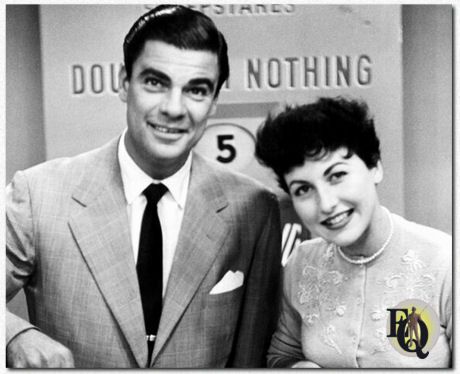 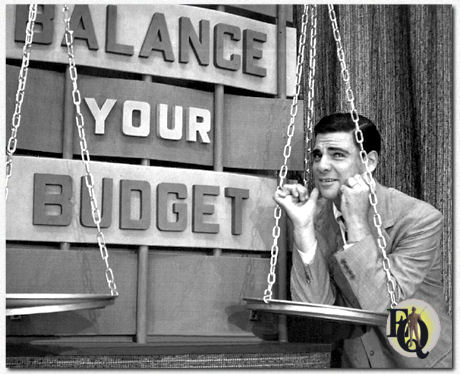
Above left: Double or Nothing
(CBS, 1952 - 1954) with Bert Parks. Five contestants were each asked a
series of questions worth $10, $20, $40 and a "Double or Nothing"
question, for maximum possible winnings of $140 per game. All
contestants participated in the "Red & White (sponsor Campbell's soup)
Sweepstakes" at the end of the show. First to answer the final question
correct won the sweepstakes. Here seen on it's first anniversary in
1953. The girl is Joan Meinch.
Above right: Bert Parks – billed as “the keeper of the Horn of
Plenty” – hosted Balance Your Budget
(CBS, 1952 - 1953) where contestants described how they
had found themselves financially temporarily embarrassed and competed to
win the amount of money they needed to run their household for one year. Contestants won money by answering general
knowledge questions correctly and ended their play when they had either
“balanced their budget” or were defeated by another player.
Parks was assisted by 18-year-old Lynn Connor. |
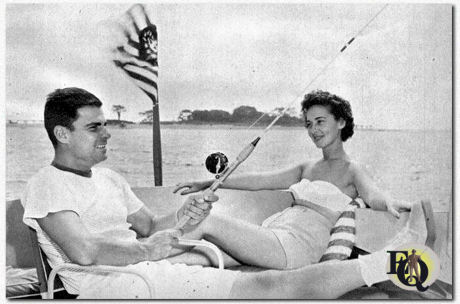
Above: The big family adventure in the summer of 1954 was
a 22-foot cruiser, christened "The Annette," of course, for his two
sweethearts. It took the place of the outboard motorboat Bert built
himself. |
|
|
|
It is a
remarkable fact that Bert Parks measures his success not by his income
but by the amount of time he can spend with his family. His present 1953
schedule gives him Tuesday and Thursday at home. He shops for groceries,
gardens (in season) and, at every opportunity, takes the boys out on
Long Island Sound in his skiff. His favorite movies are amateur pictures
of a family picnic. His favorite Christmas cards show his kids. As
parents, Bert and Annette live by the simple code he learned from his
own folks. "We make our decisions together," he explained. "What
we promise the children, we deliver. And each child gets the same
treatment as the others. No favorites."
He also continued his radio work through the American
Broadcasting Corporation and appeared on television with the Canadian
Broadcasting Corporation. The appeal of these programs did not stem from
their simple formats, modest prizes, or reserved, middle-class
contestants, who often seemed awestruck by the new medium of television.
Instead, their success lay in the charm and magnetism of their hosts.
Darkly handsome,
with slicked-back hair that evoked the Hollywood “Latin lover” image,
Parks possessed what TV Guide
critic John Crosby once called “a smile to read by.”
His warmth and exuberance lent a touch of glamour to the otherwise plain
television sets of the era. Ever gracious and effusive, he saw it as his
duty to put contestants—especially women—at ease. Footage from a
Break the Bank episode shows
him repeatedly exclaiming how “wonderful” it was to be on television.
Parks stood at the crossroads between a traditional,
Protestant-rooted Middle America and the emerging postwar culture of
consumerism. His early sponsors, Ipana toothpaste and Vitalis
hair
cream, reflected that transition. Confident in his influence, Parks told
the New York Post in a 1964
interview, “If I dropped out of a show, it was through.” In fact, he
even declined an offer to host The
$64,000 Question in 1955, fearing that the show’s large cash prizes
would overshadow the host’s presence.
|
|
By the late 1950s,
however, Parks’s prominence as a game show host began to fade. His
energetic, fast-paced style no longer resonated with audiences or
advertisers, who now preferred a calmer, more understated tone.
Compounding this decline was the public backlash against quiz shows
following the Charles Van Doren scandal, in which it was revealed that
certain contestants had been supplied with answers in advance. The
controversy forced Parks into an involuntary ten-month retirement.
In September 1955, he began his long tenure as host
of the Miss America
Pageant. Although the pageant had first been televised from
Atlantic City, New Jersey, the previous year, it was during Parks’s
debut that he introduced the now-iconic song
There She Is, with which he
serenaded the winning contestants until 1979.
|
|
|
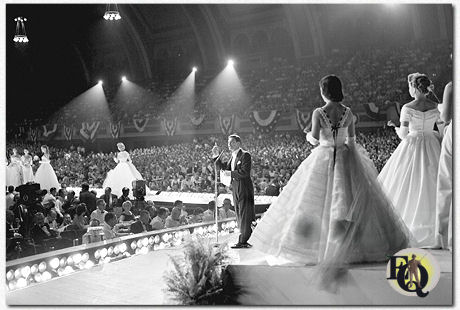
Above: Miss America Pageant featuring Bert Parks
(center) as Master of Ceremonies, on September 7. 1957. |


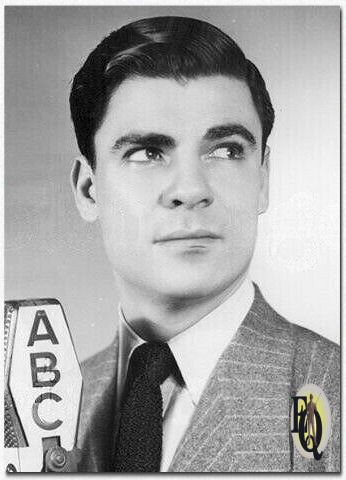















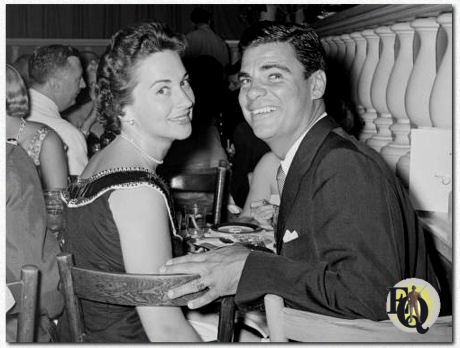
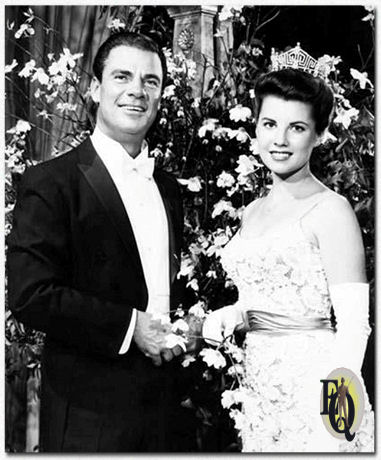
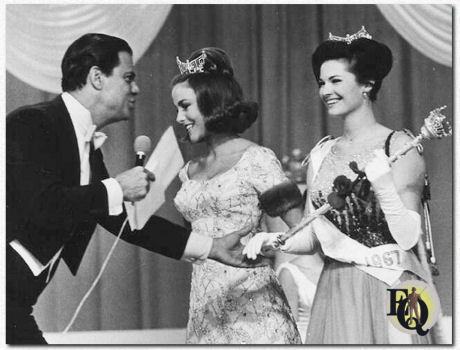
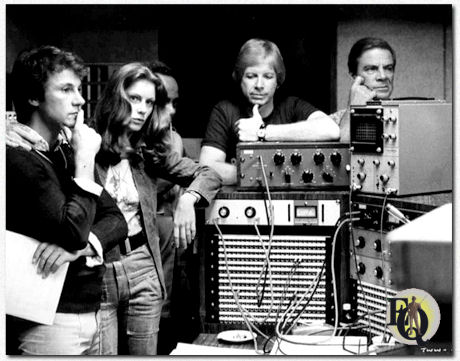
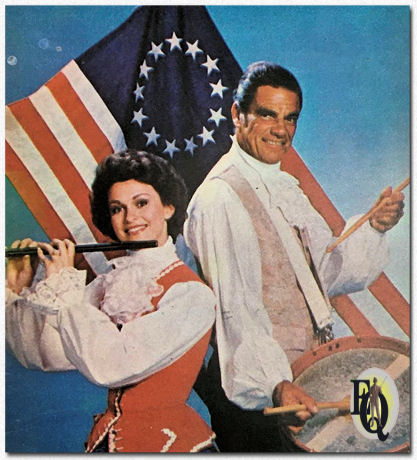
.jpg)
.jpg)
